Join us for an unforgettable evening at our Victorian Murder Mystery Dinner, held on select dates Also check out our brand new Oak Grove Cemetery Tour, held on select dates!
Warning: Undefined variable $pageIntroContent in /home/ignitioncenter/public_html/lizzieborden/wp-content/themes/lizzieborden/header.php on line 846
Murder Mystery Game

The Lizzie Borden Murder Mystery Game is a fun, Lizzie-Borden inspired board game that will provide you and your friends or family hours of grizzly entertainment. Order now.
Game Manual
August 4, 1892…
Andrew & Abby Borden are found dead in one of the rooms of the Borden house – apparent victims of foul play.
To win, you must determine the answers to these three questions: WHO KILLED THE BORDENS? WHERE WERE THEY KILLED? AND HOW?
Equipment
- Game Board: shows nine rooms of the Borden House
- 6 Colored Tokens: each represents one of the suspects in the mansion.
- 1 Die
- 6 Weapons Cards: candle stick, poison, heavy rock, meat cleaver, rusty iron and hatchet
- 6 Suspect Cards: Lizzie Borden, John Morse, William Borden, Rufus Hilliard, Dr. Seabury Bowen and Bridget Sullivan
- 9 Room Cards: Andrew & Abby Bedroom, Bridgette Sullivan Bedroom-Attic, The Barn, The Parlor, The Basement, Sitting Room, The Kitchen, Morse Bedroom and Lizzie & Emma Bedroom
- Note Cards: to aid in the investigation
Game Setup
- Take that Suspect token and place it on the assigned starting space. If fewer than 6 are playing, be sure to place the remaining tokens onto the appropriate names because they might be involved in the crime!
- Place each of the weapons at random in a room.
- Sort the cards by type into three groups: Suspects, Rooms and Weapons. Shuffle each group face-down, draw one card from each group and slide them into the “Case File Confidential” envelope. Place it onto the “X” in the center of the board.
- Shuffle the three piles of remaining cards together and deal them face down clockwise around the table.
- If you wish, check out the cards that are in your hand. You can also cross them off in your notebook as possibility.
GAME PLAY
If a player is Lizzie Borden, she goes first. The order of turn for the players then continues clockwise around the table. On each turn, a player tries to reach a different room of the house to investigate.
To start your turn, move your token by rolling the die or use a secret passage when you are in a corner room.
If you roll the die, you move your token that many spaces:
- Horizontally or vertically, forward or backward, but not diagonally.
- You are not allowed to enter the same space twice on the same turn.
- You may not enter on a space that is already occupied by another player.
If you move through a secret passage, you don’t need to roll and you can move immediately to the other room. This ends your movement. It is possible that your opponents might block any and all doors and trap you in a room. In that case, you have to wait for someone to move or
un-block a door to leave!
MAKING A SUGGESTION
When you enter a room, you can make a suggestion by naming a suspect, murder weapon and the room you just entered. e.g. “The crime was committed by John Morse in the barn with a hatchet”.
The named suspect and weapon are moved into the room you entered. Then your opponents (starting by the left player) must (if possible) prove
that your suggestion is false by showing you one card that matches your suggestion.
If the first player can’t disprove, the next player must try it, etc. .. until all players have passed.
As soon as someone shows you one of the cards, it is prooved that it can’t be in the envelope and you can cross it off in your notebook as a possibility.
If no one is able to prove your suggestion false, you may either end your turn or make an accusation.
Note: the suggestion is always made for the room your token is at that moment.
MAKING AN ACCUSATION
If you think you have solved the crime (by deduction), you can end your turn by making an accusation and name any three elements. You can say: “I accuse (suspect) of committing the crime in the (room) with the (weapon)”.
Then, you must look secretly at the cards in the envelope to check if your suggestion is correct. If you are correct, you can place the 3 cards face-up on the table to prove it and you won the game!
Note: You can only make one accusation during a game. If your accusation is wrong, you lost and you must leave the game (and board).
WINNING THE GAME
You win the game if your accusation is completely correct – that is, if you
find in the envelope all three of the cards that you named. When this
happens, take out all three cards and lay them out for everyone to see.
NOTES ON SUGGESTIONS
- When you make a Suggestion, you may, if you wish, name one or more of the cards that you hold in your own hand. You might want to do this to gain information or to mislead your opponents.
- You may, if you wish, make a Suggestion and an Accusation on the same turn.
- You may make only one Suggestion after entering a particular room. To make your next Suggestion, you must either enter a different room or, sometime after your next turn, re-enter the room that you most recently left. You may not forfeit a turn to remain in a particular room.
- You may make a Suggestion that includes a token or weapon that’s already in your room. In this case, transferring one or both of those items is not necessary. When a transfer is necessary, no transferred item is returned to it’s original position after the Suggestion is made.
- On his or her next turn, a transferred player has a chance:
- a. To move from the room in one of the usual ways; or
- b. To make a Suggestion for that room. If he or she decides to make a Suggestion for that room, that player does not roll the dice or even move his or her token.
- There is no limit to the number of tokens or weapons that may be in one room at one time.
Tips To Win
- Cross of your cards correctly
This seems obvious, but you would be surprised how many people realize after the game they didn’t cross off a card. - Eliminate one possibility every turn
If you can eliminate all false possibilities first, then you have a huge advantage over the other players. Any turn where you don’t make a suggestion is a wasted turn. - Don’t ask cards you know your opponents have
After you start by marking off all of your own cards, you want to learn about more cards you can mark off as soon as you can. If your opponents show you a card that you have already seen, then it was a wasted turn.
Note: You can suggest your own cards because nobody will be able to disprove them. - Use the secret passages
You can move from a room to another room without having to risk rolling the dice. This lets you make two suggestions in a row, without having to worry about bad luck when you roll the die. - Make new deductions based on known information
If you know that someone has the revolver card while you have the Mr. Green card and someone else shows a card to disprove the suggestion of “Mr. Green, in the library with a revolver”, then you know that card must be the library. - Figure out what your opponents know
If an opponent repeatedly uses the same item in suggestions, it probably means nobody else can disprove that item.
If someone has made three suggestions in a row about the rope, chances are high that the rope is either the murder weapon or in that opponent’s hand. - Try to learn about the room cards whenever you can
It’s usually harder to figure out in which room the crime happened because room suggestions are limited by the location of the player. - Spend your time in rooms
When you enter a room, make a suggestion. If someone suggests you and drags you to a new room, make a suggestion there on your next turn. Not only will this let you learn more about the weapons and people, but you can use the unfair summons trick. If another player is about to reach a good room to make a suggestion, you can make a suggestion about that player’s character, which will drag their pawn back to your room. When that player takes his next turn to make a suggestion in your room, you can simply show your room card.
SUSPECTS
LIZZIE A. BORDEN – Born July 19th, 1860 in Fall River, Massachusetts to the late Andrew Borden and his first wife, Sarah M. Borden. Although many find it hard to believe a woman could be capable of such vicious murders, Ms. Borden remains at the top of the suspect list. As the daughter of the wealthy Mr. Borden, there is financial gain for her in the event of his death. Or perhaps this is a result of a woman being pushed to her limits after years of being forced to live well below their means by her frugal father? Whatever the reason, she offers suspiciously serendipitous explanations for how she managed to miss both brutal attacks. She places herself within very close proximity to both victims at the estimated times of death. Was Lizzie really in the right place at the right time, narrowly avoiding the bloody scene? Or is this perhaps the calculated story of a cold-blooded killer, anticipating that the people underestimate her due to her feminine nature?
JOHN V. MORSE – Born July 5th, 1833 in Somerset, Massachusetts, the younger brother of Mr. Borden’s first wife, Sarah Morse Borden, and Uncle to Lizzie and Emma. Morse currently works as a livestock trader after retiring from a long career as a butcher. Needless to say, a man of his experience would know his way around a hatchet. Despite relocating to Hastings, Iowa nearly 25 years prior, Mr. Morse arrives at the Borden household the evening before the murders. One can not help but find it suspicious that Mr. Morse arrived completely unannounced without even so
much as a single piece of luggage, or a change of clothes for the next day. Rumor has it that Morse had an unfortunate business dealing with the late Andrew Borden, resulting in bad blood between the two men. Morse offers an incredibly detailed alibi for the morning of the murders, including full names of strangers, license plates of trolly carts, and many other intricate
pieces of information. Why would someone need to memorize such small details unless in an attempt to cover one’s tracks later on? Were these murders the revenge of a scorned business partner? Is there a bloodthirsty killer lying beneath his calm and cool temperament?
WILLIAMS. BORDEN – Born April 20th, 1854 in Fall River, Massachusetts, laborer and peddler. Borden is rumored to be the illegitimate son of Andrew Borden and his sister-in-law Phebe Borden, born out of wedlock and dismissed to secrecy. William has a history of mental illness and has spent most of his adult years in an asylum. Many who know him speak of his antisocial behavior and tendencies to threaten violence with his favorite tool; his hatchet. It is rumored that Andrew supported his care financially, until one day he was cut off and disowned. After years of being hidden in the shadows as Andrew’s dirty secret, was this the final straw that caused William to snap and give in to his violent tendencies? Was this already unstable man finally unhinged, resulting in the blood bath on Second Street?
BRIDGETTE “MAGGIE” SULLIVAN – Born June 20th, 1867 in Cork County, Ireland, Ms. Sullivan works as the live-in housemaid for the Bordens. Much like Lizzie, Bridget places herself within alarming proximity to both victims at the time of their deaths. How could anybody reside within the small household and not hear the commotion from these brutal assaults? Much like many of the wealthy elite of Fall River, the Bordens were known to have a distinct prejudice against the Irish. Perhaps Ms. Sullivan simply could not take the disrespect anymore, lashing out at her employers. She tried to quit on several occasions, but each time Bridget was bribed back by Abby Borden. What made her so desperate to get away from that house? Maybe she didn’t act alone? Some suspect a conspiracy amongst Lizzie and Bridget, as they were the only two in the household who survived the morning of August 4th. The two women maintain their stories as part of each other’s alibis.
DR. SEABURY BOWEN – Born July 22nd, 1840 in Attleboro, Massachusetts, Bowen is a physician and decorated Civil War surgeon. Dr. Bowen lives directly across the street from the Bordens and is also the family doctor. Seabury caused quite a stir amongst the residents of Second street, as he was often seen escorting Lizzie Borden to church. Being a married man, this was considered scandalous and his friendship with Lizzie thought of as very odd. Did Dr. Bowen take pity on Lizzie, and in an attempt to free her from her frugal father take matters into his own hands? 24 hours before her own violent murder, Abby Borden desperately tried to convince Dr. Bowen that her and the entire family had been poisoned, as they had all been severely ill for several days. She pleaded for help, but it fell upon deaf ears for several days. She pleaded for help, but it fell upon deaf ears for Bowen dismissed the matter as mere food poisoning. Not only was Bowen the very first doctor to arrive at the Borden home, making it easy for him to tamper with the scene or hide evidence but he continues to raise suspicion as he repeatedly seems to try and deter the investigation, even throwing potential evidence into the fire. He further complicates the matter by prescribing Ms Lizzie a heavy dose of morphine while she is being interrogated, making it very difficult for her to answer questions. Why would the family doctor involve himself to such a high degree? Is he protecting Miss Lizzie, or perhaps trying to cover-up his own bloody involvement?
RUFUS B. HILLIARD – Born May 5th, 1849 in Pembroke, Maine, elected City Marshall of Fall River in 1886. Hilliard acts as the lead investigator for the Borden murders, and is present at the scene following the discovery of the bodies. On the morning of August 4th he places himself in Warwick, Rhode Island with the rest of the department celebrating their yearly clam boil. Suspiciously, this information was made readily available to the public, opening the door to endless possibilities for crime and violence in the city of Fall River. Is this an unfortunate misjudgment, or a carefully concocted plan and an intentional offering of opportunity? Following the murders Hilliard very aggressively persues Ms. Lizzie as his prime suspect, denying the possibility of any other culprit. Is this a frantic attempt to cover up something much more sinister that runs even deeper than we imagined? Perhaps Hilliard is intentionally misleading the investigation to frame Lizzie. Is it possible that this conspiracy goes straight to the top?
What's Inside?
Here's a sample of what you can expect to find when you open up the game box.
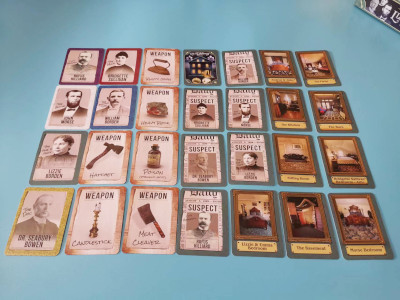
28 Game Cards
Game Board
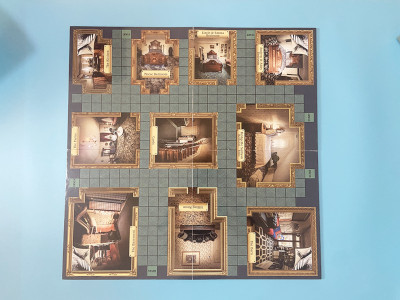
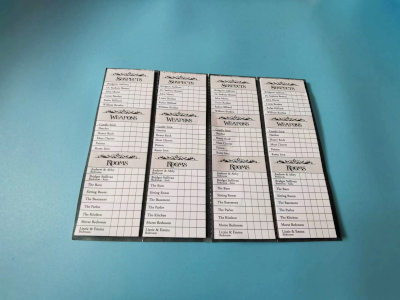
Note Sheets
Tokens & Stands
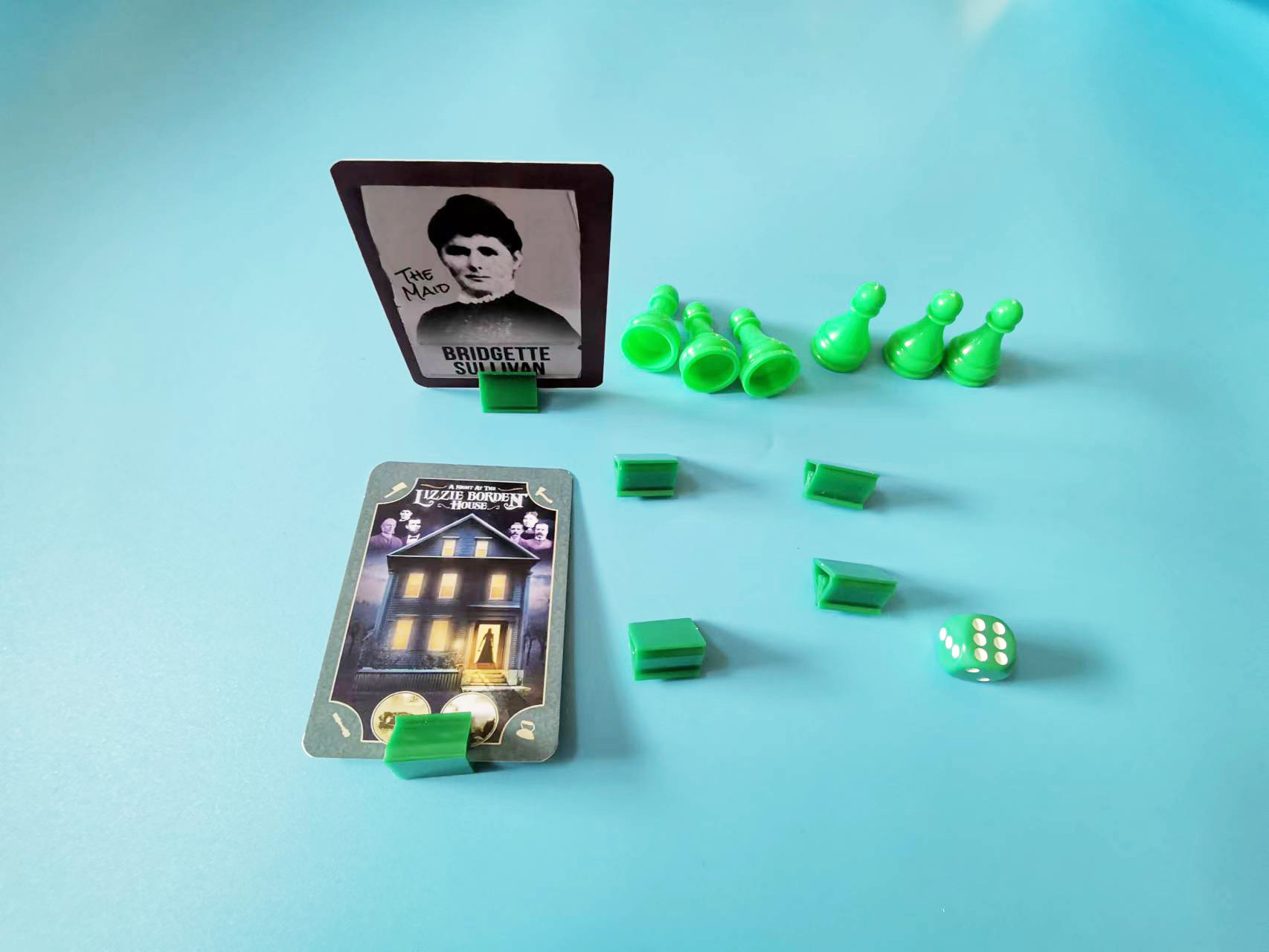
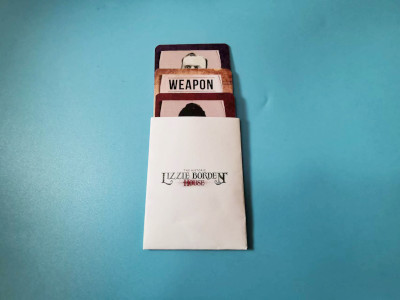
Envelopes for Cards
Rule Book
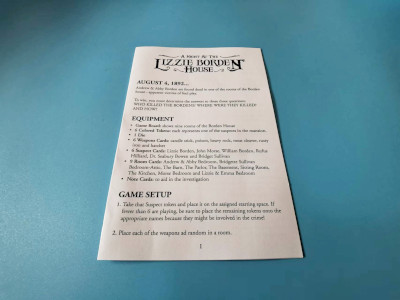
Stay Up To Date
This page will always be updated with the most recent information. Check back often!

